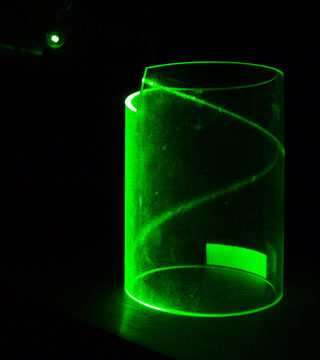Course Description
This resource contains demonstrations used to illustrate the theory and applications of lasers and optics. A detailed listing of the topics can be found below.
Lasers today are being used in an ever-increasing number of applications. In fact, there is hardly a field that has not been touched by the laser. Lasers are …
This resource contains demonstrations used to illustrate the theory and applications of lasers and optics. A detailed listing of the topics can be found below.
Lasers today are being used in an ever-increasing number of applications. In fact, there is hardly a field that has not been touched by the laser. Lasers are playing key roles in the home, office, hospital, factory, outdoors, and theater, as well as in the laboratory.
To learn about lasers and related optics, one usually takes a course or two, or acquires the necessary information from books and journal articles. To make this learning more vivid and more exciting, and, one hopes, more understandable, one needs to see some of the basic phenomena involved. To fill this need, Professor Ezekiel has videotaped 48 demonstrations that illustrate most of the fundamental phenomena relating to lasers and physical optics.
By using split-screen inserts and a wide range of video-recording capabilities, it is possible to show real-time effects in lasers and optics with the simultaneous manipulation of the components that cause these effects. In this way, one can see effects in close up that would be difficult, if not impossible, to display in front of an audience or in the classroom.
These video demonstrations are designed for:
- The individual student of lasers and optics who wants to observe the various phenomena covered in theoretical treatments in courses, books, and technical papers.
- The Instructor in lasers and optics in a company, university, college, or high school who wants to illustrate, in class, many of the fundamental phenomena in optics and lasers.
These videos were produced by the MIT Center for Advanced Engineering Study.
Course Info
Instructor
Departments











